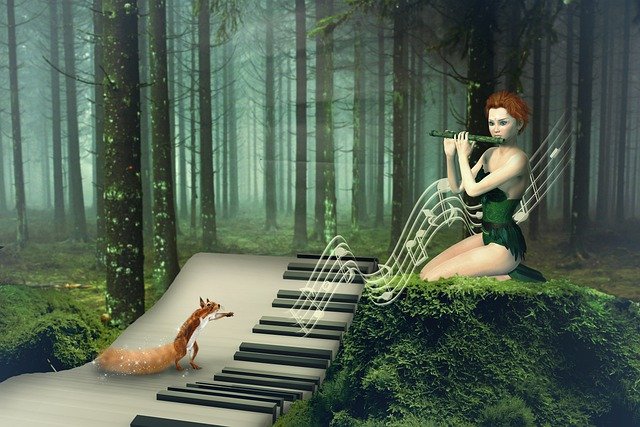Creating a compelling and immersive soundtrack for your game can be just as important as the gameplay itself. The right music sets the tone, enhances the story, and evokes emotions that make the gaming experience memorable. While big studios often hire well-known composers, independent game developers often have the challenge of finding quality music that fits both their vision and their budget.
Fortunately, independent artists are a rich and often untapped source of inspiration for game music. Whether you're looking for atmospheric ambient tunes, dramatic orchestral scores, or energetic beats for action sequences, independent composers offer a variety of styles and sounds that can bring your game’s world to life. In this blog, we'll discuss where to find game music inspiration from independent artists and highlight Ninichi’s collection of game music soundtracks: on her website and on bandcamp - as great resources for developers.
1. Online Marketplaces for Independent Music
One of the best ways to find inspiration for your game soundtrack is to explore online music marketplaces. These platforms allow independent composers to showcase and sell their music directly to game developers. Some of the most popular sites for finding game music from independent artists include:
AudioJungle: Known for a huge library of tracks in every genre imaginable, this platform allows you to search specifically for game music and soundtracks. You can find both royalty-free and exclusive compositions from independent artists here.
GameDev Market: This site caters specifically to game developers and features a collection of game music tracks, sound effects, and other assets. Many of the artists on this platform are independent and offer their work at affordable prices.
Indie Game Music Packs: As the name suggests, this platform specializes in providing game music created by indie composers. Whether you're looking for battle themes, ambient tracks, or cinematic scores, you’ll find an extensive library of options to fit your project.
Bandcamp: Bandcamp is a great platform for discovering unique, often experimental game music from independent artists. Many game music composers upload their full albums here, and you can support them directly by purchasing their work.
2. Composer Websites and Portfolios
Many independent composers also have personal websites or portfolios where they showcase their music. Searching through these sites gives you the chance to listen to their work and even connect with them directly for a custom collaboration or music pack.
Some composers offer free samples of their work or have specific game music albums ready for purchase. These tracks are often crafted with game developers in mind, making them a great resource for game soundtracks.
For instance, Ninichi, a talented composer, offers a variety of game music soundtracks on her website. She has a collection of royalty-free music packs, which are ideal for indie game developers on a budget. Ninichi’s music covers a wide range of genres and themes, including fantasy, chiptune, ambient, and more. Her compositions are specifically designed for game environments, which means you can find the perfect soundtrack that complements your game’s setting and mood.
3. SoundCloud and YouTube
Both SoundCloud and YouTube are fantastic platforms for discovering new and up-and-coming independent game music composers. Many musicians post their work here to gain exposure and connect with potential collaborators. You can often find full albums or individual tracks that fit your needs.
SoundCloud has many independent artists who specialize in creating music for games, and you can use the platform’s tagging and search features to find soundtracks for specific genres or themes. On YouTube, you can find composers sharing their music as well as tutorials, behind-the-scenes videos, and music analysis that can provide further inspiration for your own game music.
4. Game Jams and Communities
Game jams, like Ludum Dare or Global Game Jam, bring together indie developers from around the world to create games within a short time frame, often under specific themes or constraints. These events can be a great source of inspiration for music, as composers working on game jams often share their tracks publicly.
There are also active communities on platforms like Discord or Reddit (e.g., r/gamemusic), where independent composers and game developers can share their work, collaborate, and exchange ideas. These communities are a great place to find up-and-coming talent or discover fresh takes on game music.
5. Music Libraries for Indie Developers
There are a growing number of music libraries that cater specifically to the needs of indie game developers. These platforms often offer both royalty-free and exclusive tracks, allowing you to find game music that fits your project’s needs at an affordable price. Websites like Pond5, Bensound, and Marmoset offer both indie and established artists’ music, curated to fit a range of genres and game types.
These libraries can save you time in searching for the right music and offer the flexibility to use tracks without the need to hire a composer for a fully custom score. However, they do offer less flexibility compared to working with an individual composer directly.
6. Ninichi’s Collection of Game Music Soundtracks
For indie developers looking for professional game music that’s ready to use, Ninichi’s collection of game music soundtracks is a fantastic resource. Ninichi, as an independent composer, creates high-quality soundtracks designed with games in mind, offering a diverse range of music that can enhance the experience of any game.
Ninichi offers a variety of royalty-free game music packs that are perfect for indie developers, including tracks for fantasy games, action games, and more. Whether you need a catchy chiptune track for a retro-style game or an atmospheric piece for a mystery or adventure game, Ninichi’s music is versatile, accessible, and ready to use.
Her soundtracks are not only composed with a deep understanding of game dynamics but also crafted to be immersive and emotionally engaging, making them an excellent choice for developers seeking to bring their games to life with music.
Conclusion
Finding inspiration for your game music soundtrack doesn’t have to be a daunting task. Independent composers are an incredible source of creativity, offering unique, high-quality music that can make your game stand out. From online marketplaces and personal composer portfolios to communities and game jams, there are plenty of ways to discover great game music.
If you're looking for a reliable and affordable source of music, be sure to check out Ninichi’s collection of game music soundtracks. Whether you want royalty-free music packs or need custom compositions for your game, Ninichi’s music offers both flexibility and high quality, ensuring your game’s soundtrack will be a perfect fit. Explore her collection and find the soundtrack that suits your game’s world today!

















